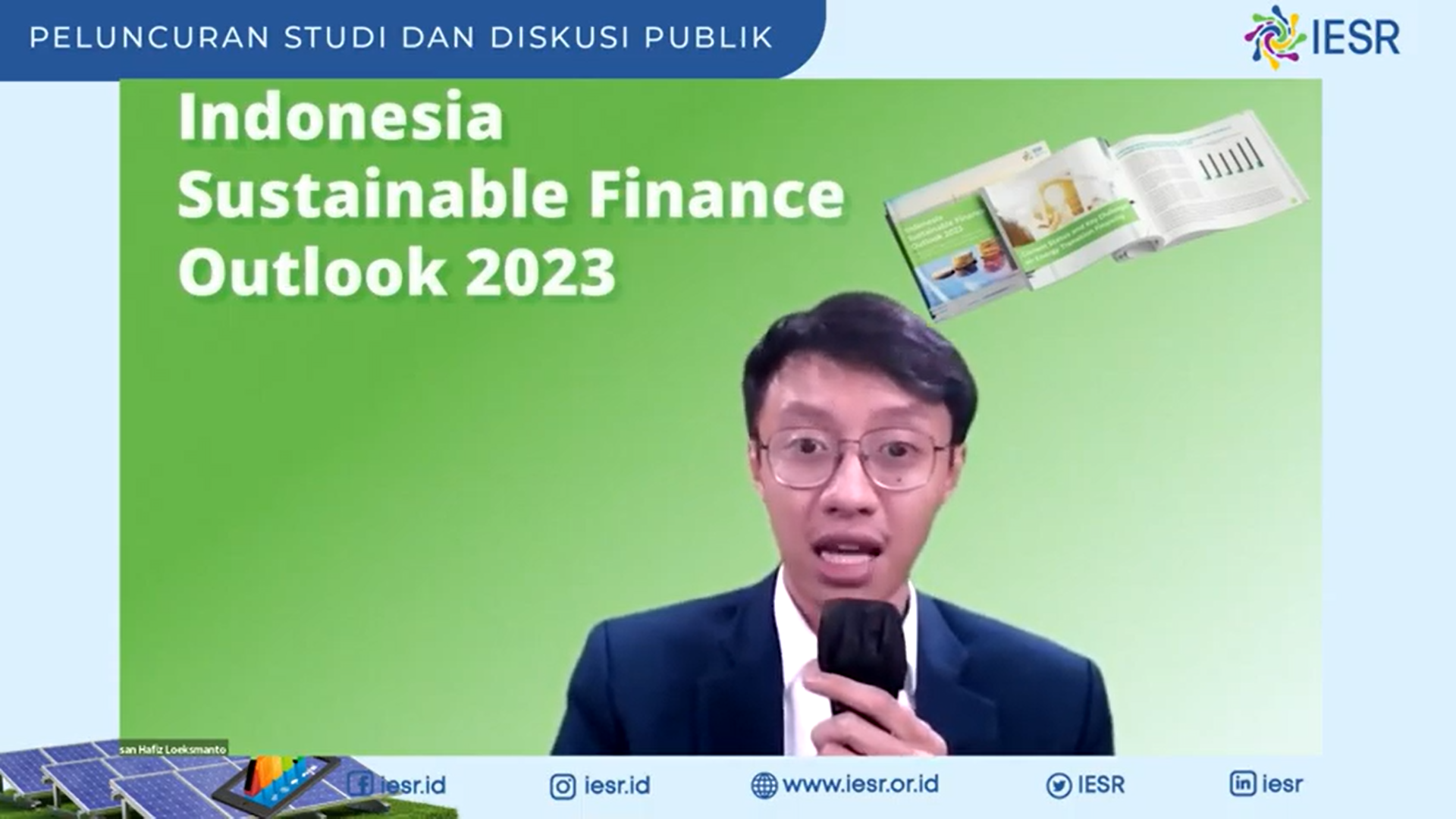Jakarta, October 17, 2022 – Institute for Essential Services Reform (IESR) launched its latest flagship report titled Indonesia Sustainable Finance Outlook (ISFO) 2023. This report is part of the Indonesia Energy Transition Outlook (IETO) which will be launched in December 2022. ISFO 2023 specifically discusses the development of energy transition financing in Indonesia. In his opening remarks, IESR Executive Director, Fabby Tumiwa stated that Indonesia needs massive and drastic transformation steps to ensure that we are in line with the Paris Agreement target, which is to limit the earth’s temperature to 1.5 degrees.
“In 2030 we have to cut 45% of emissions at 2010 level. For that, massive and drastic transformation efforts must be made. Especially by the G20 countries which are responsible for 85% of the world’s total GHG emissions. Indonesia is ranked 7th as an emitting country originating from the forest and land sector, and energy,” explained Fabby.
A study by IESR and the University of Maryland shows that in order to comply with the 1.5-degree temperature increase limit, the entire capacity of PLTU in Indonesia, totaling 44 GW, must be terminated by 2045. In the period 2022 – 2030, 9.2 GW of PLTU must be retired. The remaining capacity will be phased out until 2045.
IESR estimates the cost to close 9.2 GW of the coal-fired power plant during 2022-2030 at $4.6 billion. Early retirement of all coal-fired power plants in 2045 with an average age of 20 years requires $28 billion, this cost for stranded asset compensation and decommissioning costs.
Farah Vianda, IESR’s Green Economy Program Officer and one of the authors of ISFO 2023 explained that the financing situation for the energy transition in Indonesia is still very low.
“We still lack funding to achieve our renewable energy targets by 2025, to halt coal operations, and to mitigate transition risks,” he said.
Farah added that technically the limited availability of public funding (APBN) and the existence of government policies that support the use of fossil energy sources make financial and investment mobilization for the energy transition quite difficult, in terms of financial institutions themselves there are still few policies that support financial institutions to support transition financing energy.
Ichsan Hafiz Loeksmanto, Lead Author of ISFO 2023, highlighted one of the sustainable financing instruments, namely the carbon tax. According to Ichsan, although he has planned to implement a carbon tax, and a cap & trade mechanism on 92 coal-fired power plants in 2022, the carbon tax revenue is not earmarked. This means that the use of carbon tax revenues has not been devoted to financing climate change mitigation and adaptation efforts.
“The government needs to ensure the allocation of carbon tax revenues for climate mitigation & adaptation, and social safety nets. In addition, there is also a need for public transparency regarding payment of carbon taxes and carbon transactions,” explained Ichsan.
Fransiska Oei, Head of Legal & Regulatory Study Development at Perbanas, said that local financial institutions need at least two supports. First, for financing risk management and capacity building support for risk analysis for renewable energy projects.
“The bank’s ability to analyze the feasibility of the renewable energy project is still lacking, we are trying to work with other organizations (ex: USAID) to understand the risks and their mitigation, besides that maybe we also need regulatory support to ease the prudential banking regulation for this renewable project,” said Fransiska.
Lutfyana Larasati, Senior Analyst of Climate Policy Initiatives, stated that in the future there should be more eligible projects to be included in green bonds or green sukuk. PBI 24 of 2022 has provided greater space for banks and financial institutions to contribute to green financing, especially in projects funded by green bonds and green sukuk.
“We need to synchronize the indicator criteria for the green taxonomy so that there are more (green) projects that are eligible to receive public funding, either through green bonds or green sukuk,” said Lutfyana.
Radian Nurcahyo, Assistant Deputy for Maritime Law and Agreements, Ministry of Maritime Affairs and Investment emphasized that energy is the driving force of the economy. Therefore, the investment for this energy transition must continue to be mobilized.
“The Ministry of Finance has issued blended finance schemes such as the energy transition mechanism and country platform for funding sources for phasing down coal power plants, the SDG Indonesia one platform as green energy development to achieve NZE 2060,” explained Radian.

